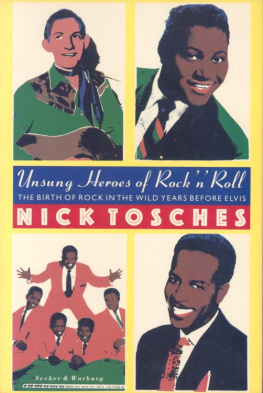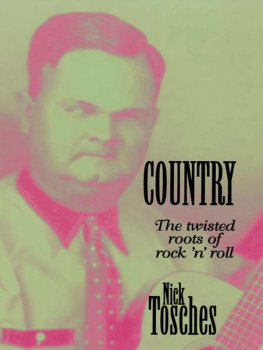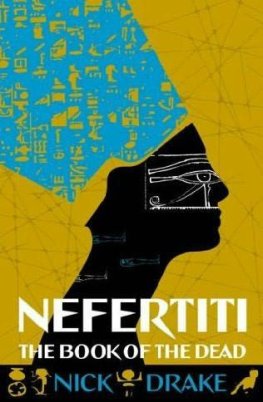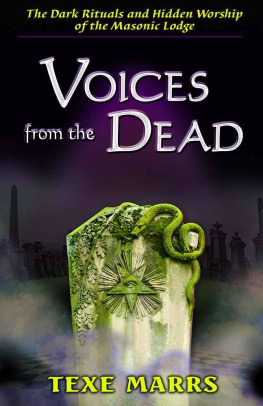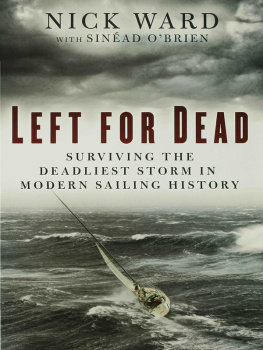Nick Tosches - Where Dead Voices Gather
Here you can read online Nick Tosches - Where Dead Voices Gather full text of the book (entire story) in english for free. Download pdf and epub, get meaning, cover and reviews about this ebook. year: 2001, publisher: Little, Brown and Company, genre: Detective and thriller. Description of the work, (preface) as well as reviews are available. Best literature library LitArk.com created for fans of good reading and offers a wide selection of genres:
Romance novel
Science fiction
Adventure
Detective
Science
History
Home and family
Prose
Art
Politics
Computer
Non-fiction
Religion
Business
Children
Humor
Choose a favorite category and find really read worthwhile books. Enjoy immersion in the world of imagination, feel the emotions of the characters or learn something new for yourself, make an fascinating discovery.

- Book:Where Dead Voices Gather
- Author:
- Publisher:Little, Brown and Company
- Genre:
- Year:2001
- Rating:4 / 5
- Favourites:Add to favourites
- Your mark:
- 80
- 1
- 2
- 3
- 4
- 5
Where Dead Voices Gather: summary, description and annotation
We offer to read an annotation, description, summary or preface (depends on what the author of the book "Where Dead Voices Gather" wrote himself). If you haven't found the necessary information about the book — write in the comments, we will try to find it.
Where Dead Voices Gather — read online for free the complete book (whole text) full work
Below is the text of the book, divided by pages. System saving the place of the last page read, allows you to conveniently read the book "Where Dead Voices Gather" online for free, without having to search again every time where you left off. Put a bookmark, and you can go to the page where you finished reading at any time.
Font size:
Interval:
Bookmark:
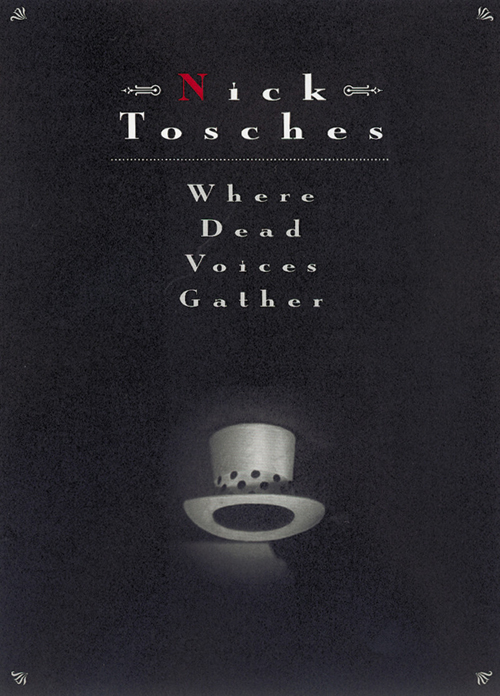

Mashed Potatoes started long time ago.
Dee Dee Sharp
In the beginning was the Word.
John 1:1
Alternative music sucks. Blows dead dogs. I hate alternative music. I hate alternative people. They can all kiss my ass. Lets go have a big steak and fuck without a rubber and do some heroin afterward.
James Iggy Pop Osterberg
M any years ago, I wrote a book called Country. Two of the chapters closest to its heart were devoted to the mystery of Emmett Miller, whose startling and mesmerizing music seemed to be a Rosetta Stone to the understanding of the mixed and mongrel bloodlines of country and blues, of jazz and pop, of all that we know as American music.
The alchemy of Emmett Millers music is as startling today as it was when he wrought it. Definable neither as country nor as blues, as jazz nor as pop, as black nor as white, but as both culmination and transcendence of these bloodlines and more, that alchemy, that music, stands as one of the most wondrous emanations, a birth-cry really, of the many-faced and one-souled chimera of all that has come to be called American music. The very concept of hima white man in blackface, a hillbilly singer and a jazz singer both, a son of the deep South and a rou of Broadwayis at once unique, mythic, and a perfect representation of the schizophrenic heart of what this country, with a straight face, calls its culture.
I first became intrigued by the elusive figure of Emmett Miller in 1974. I may have been vaguely aware of him before then, but it was I Love Dixie Blues, the album Merle Haggard dedicated in part to Millers music, that truly whetted my curiosity. In the bargain bin of a record store on Eighth Street in New York, I found a copy of an album whose stark and drab cover was ugly even by bootleg standards: title misspelled in plain black lettering on plain yellow stock. But this cover belied not only the beautiful disc of clear green vinyl that lay within, but more so the wonder of what that green vinyl held. Issued by the Old Masters label in 1969, Emmet Miller Acc. by His Georgia Crackers had been the first in a series of limited-edition pressings for jazz collectors; the spelling of Millers name was obviously not as important as the fact that these recordings featured rare performances by Tommy and Jimmy Dorsey, Eddie Lang, and Gene Krupa. Subsequently reissued on common black vinyl but with Millers name spelled right, in black on white, this album remained the sole available collection of Millers work for more than a quarter of a century, superseded only in 1996 by Emmett Miller: The Minstrel Man from Georgia, a Columbia/Legacy CD that included six recordings more than the earlier album.
When I heard Millers actual voice, forthshining from the coruscations of those slow-spinning emerald grooves, I was astounded, and my search for information on him began in earnest. What little I found was included three years later in Country. It is not known exactly when Emmett Miller was born or when he died, I wrote. Nor is it known where he came from or where he went. We dont even know what he looked like, really.
For a long time, these statements remained true. In November of 1988, eleven years to the month after the publication of Country, another bookbigger and more lavish, but with a similar titlebrought forth the first published photograph of Miller. The book was Country: The Music and the Musicians, produced by the Country Music Foundation and Abbeville Press. I wrote the chapter on honky-tonk, in which I devoted two paragraphs to Millers influence on Hank Williams; and it was in this context that the photograph of Miller, middle-aged and in blackface, appeared as an illustration. Five years later, Abbeville published a parallel volume called Nothing But the Blues: The Music and the Musicians, in which a second picture of Miller, also in blackface, accompanied four paragraphs on him, as an influence on Jimmie Rodgers, in a chapter by Charles Wolfe on white country blues. But beyond these curious masked images, the mystery of Emmett Miller remained largely unsolved, and the words Id written long ago remained largely true.
In 1994, in a Journal of Country Music article called The Strange and Hermetical Case of Emmett Miller, I set forth all that had been discovered regarding Miller since the writing of Country. And yet, even then, it could not be said with certainty exactly when or where he was born, or exactly when or where he died, or even whether Emmett Miller was really his name. The paragraphs on Miller in Nothing But the Blues stated with an air of certitude that Miller was born in Macon, Georgia, in 1903. This assertion would be repeated by Wolfe a few years later in the notes to the Minstrel Man from Georgia CD: Emmett Miller, we now know, was from Macon, Georgia, born there in 1903. His parents were longtime residents of the area, and owned a nearby farm. But no evidence for these facts was offered, and I chose to doubt them. As it turned out, I was right to doubt: Emmett Miller was not born in 1903, and drinking milk was probably the closest his family came to owning a farm.
But for all my sensible doubting and senseless searching, the mystery of Emmett Miller, after twenty years, remained unsolved. And who cared? Indeed, when I stopped to think of it, I wondered what end this search could serve, except, as it did, to distract me from more meaningful and lucrative pursuits. Unfinished poems, an unfinished novel, magazine assignments were pushed aside, and for what? To follow a ghost? This distraction from more meaningful and lucrative pursuits had, for me, a strong, perhaps pathological appeal; but that did not explain it, for there are other far more enjoyable distractions. Ultimately I did not and could not, I do not and cannot, explain it. I can say that the search, the mystery, was twofold. Who was this guywhen was he born, when did he die? And what was the source of his music, vanished in the undocumented darkness and the lost and unknown recordings of an unexplored subculture? Whether seen as detective work or archeology, as serious investigation or deranged folly, the case of Emmett Miller was not without its gratifications, its thrills and satisfactions of discovery and of learning.
As for its being without meaning, it now has occurred to me, in the few sentences since my mention of more meaningful and lucrative pursuits, that, after all is said and done, meaning is the biggest suckers-racket of all; and any regard for it, no matter how fleeting, befits a middle-aged fool like me. So meaning be damned; on with these words.
In the spring of 1996, as was I revising and expanding the Journal article to appear as the appendix to the reprint of Country published by Da Capo Press, I received a call from my friend and intrepid cohort Bret Wood.
Earlier Bret had found, amid handwritten records of the Thirteenth Census of the United States (1910), evidence of a thirteen-year-old white male named Emmett Miller living with his family in the town of Barnesville, in Pike County, Georgia, about midway between Atlanta and Macon.
For years I had been unsure that Emmett Miller was the real name of the person whose identity I sought. Poring through the Minstrelsy columns of issues of Billboard from the 1920s, on reel after reel of microfilm, I had come across many obscure performers named Emmett. Too many. I suspected that the name of Emmett had been taken commonly by minstrels to evoke the name of Daniel Decatur Emmett, the most celebrated of the old-time minstrels. I thought this might help to explain why no biographical facts had been unearthed regarding the birth, death, or offstage life of Emmett Miller. At the same time, removing the possible baffle of his first name left only a surname so common that his true identity might never be found.
Font size:
Interval:
Bookmark:
Similar books «Where Dead Voices Gather»
Look at similar books to Where Dead Voices Gather. We have selected literature similar in name and meaning in the hope of providing readers with more options to find new, interesting, not yet read works.
Discussion, reviews of the book Where Dead Voices Gather and just readers' own opinions. Leave your comments, write what you think about the work, its meaning or the main characters. Specify what exactly you liked and what you didn't like, and why you think so.

